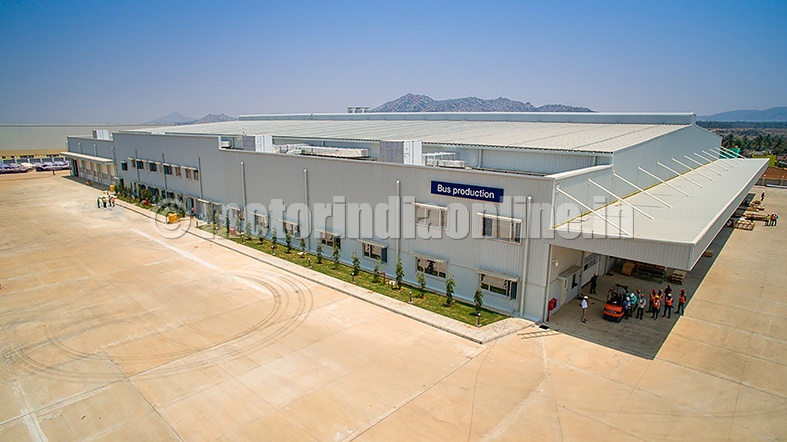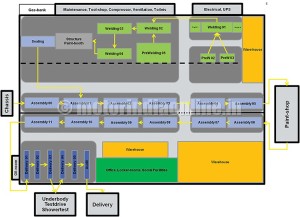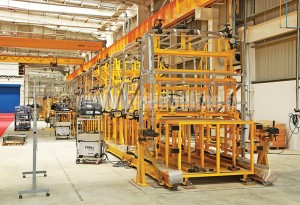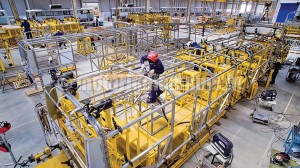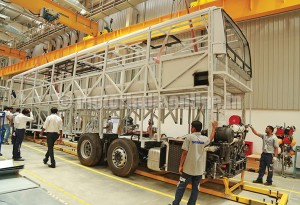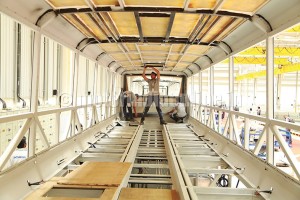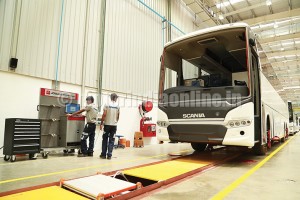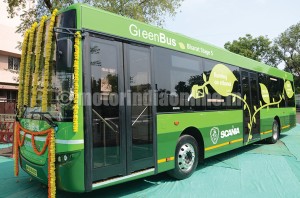Scania Commercial Vehicles India officially inaugurated its first Indian bus manufacturing plant at Narasapura on March 31. The facility was opened by Mr. Nitin Gadkari, Union Minister of Road Transport and Highways. The facility reflects Scania’s long-term focus on the Indian commercial vehicle market which it entered around a decade back. With a current capacity of 1,000 units per year, the plant will employ 300 persons in its first year of operation.
Mr. Martin Lundstedt, President and CEO, Scania CV, Mr. Anders Grundströmer, Managing Director, Scania India and Senior Vice President, Scania Group, and Mr. Klas Dahlberg, Senior Vice President Buses & Coaches, Scania Group, commemorated the announcement of the manufacturing facility.
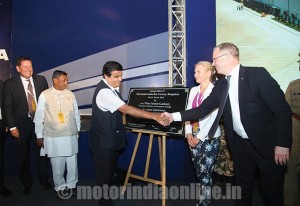
Mr. Martin Lundstedt commented: “Scania’s bus manufacturing facility in Narasapura, which we inaugurate today, is yet another milestone in our strategic plans for India. The vision for Narasapura is clear – it is a world class facility serving both the Indian market and becoming a hub for exports to other markets in Asia. Scania has and remains committed to bringing global technology and manufacturing practices to the countries in which it operates. Here in India, we will always strive to create a win – win situation for our partners. The goal is to draw on local talent and competence and combine it with global experience – making all our facilities part of our global network and in turn creating tremendous value across our global value chain. We see Narasapura as an important addition to our global operations and are committed to making it a success.”
Mr. Lundstedt added: “We also know that Narasapura’s success so far and in the future will be enabled by joint efforts of all stakeholders – local suppliers, workforce, State and local governments, and we value this partnership”.
In October 2013, Scania inaugurated its truck manufacturing facility in Narasapura. Scania has collectively invested around Rs. 300 crores in their truck and bus manufacturing facility. The current yearly capacity of the manufacturing plant is 2,500 trucks and 1,000 buses. The bus plant will also serve as an export hub for regions such as Asia, Middle East and Africa Over the next five years, Scania aims to double its production capacity by 2,500 units of buses and 5,000 units of trucks and recruit about 800 employees by the end of 2017.
Mr. Anders Grundströmer, Managing Director, Scania India and Senior Vice President, Scania Group, said: “Scania has been the frontrunner in promoting sustainable transport solutions globally. We entered India with a vision to provide sustainable transport solutions to the country and formulated various channels for promoting it. The establishment of our bus manufacturing facility plays a major role in realizing this vision for India. The facility will accommodate a state-of-the-art bio-gas unit, which will help in producing alternative fuels locally. With this bus plant we are looking at locally assembling buses and coaches in India, and stay true to the vision of ‘Make in India.’ ”
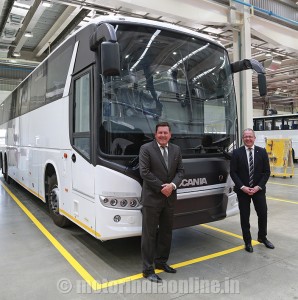
The manufacturing facility in India is Scania’s ambitious venture and a strategic move to drive their global vision to new heights. Scania’s commitment of setting up a large manufacturing establishment is in sync with India’s dynamic vision of making the country a new destination for manufacturing. “The ‘Make in India’ campaign will facilitate the manufacturing sectors to grow rapidly and Scania will be a true ambassador of this campaign as we will enable large-scale manufacturing activities in India and strengthen employment”, Mr. Grundströmer said.
Mr. Klas Dahlberg, Senior Vice President Buses & Coaches, Scania Group, said: “The all new bus manufacturing facility in India is a great leap towards realizing Scania’s global vision. This facility will be used to its full capacity and we are looking at exporting the buses and coaches to the neighboring countries of India. The geographical position of India will act as an advantage to Scania in connecting with Far East Asian countries, Africa and Middle Eastern countries. India’s new vision favours international players to set up manufacturing facilities here and we will accomplish our vision in India as well as globally.”
Scania’s promise of delivering sustainable transport solutions in India takes a major step forward with the bus manufacturing plant. The plant will house a bio-gas production unit and will locally assemble ethanol buses. The company will also broaden the scope for manufacturing more products powered by alternative fuels, which will catalyse sustainable development in India to a whole new level.
Scania and Swedfund invest in Indian biogas
Scania and the development financier of the Swedish state Swedfund are establishing a partnership to develop production of biogas as an automotive fuel in Nagpur, which has 2.5 million inhabitants. The biogas will be produced from digested sludge from one of the city’s wastewater treatment plants in collaboration with local companies. Nagpur is participating in the Indian Government’s initiative to improve the environment and transport systems in the country’s 100 largest cities.
“This is a Swedish venture, which in a sustainable and profitable manner can create many new jobs and contribute to India’s shift towards renewable fuels. Biogas is the fuel of the future, which will contribute to solving India’s huge pollution problems while taking a comprehensive approach to the major environmental challenges,” says Swedfund’s CEO Anna Ryott.
The plans for the biogas project were presented in connection with the inauguration of Scania’s bus facility at Narasapura in Karnataka.

Today India occupies the third place in terms of global carbon dioxide emissions, and these emissions are expected to double in the next few decades. In line with the country’s continued urbanisation, the quantity of waste produced in the cities is also increasing.
“Scania has vehicles and technologies that can contribute to this shift, here and now. We see great opportunities for Sweden as a country to lead the development towards sustainable cities in the world in general and in India in particular. For this reason, we are extremely happy to be able to take this step together with Swedfund”, says Scania’s President and CEO Martin Lundstedt.
Initiative in 100 cities with international support
The Indian Government led by Prime Minister Narendra Modi is working actively to improve the environment and accessibility in 100 large cities in the country. The initiative is called Smart Cities. The Government is also approaching international companies that want to invest in technologies and systems that can promote the development of sustainable cities.
Producing biogas from waste in major cities and residual products from agriculture represents an important part of the solution to India’s problems with air pollution, waste management and the cost of imported energy.
Swedfund, which is owned by the Swedish State, offers risk capital, competence and financial support for investments in growth markets in Africa, Asia, Latin America and Eastern Europe. The task is to reduce poverty by creating sustainable business, which contributes to economic, environmental and social development. Since 1979, Swedfund has been an active, responsible and long-term investor in more than 230 companies.
